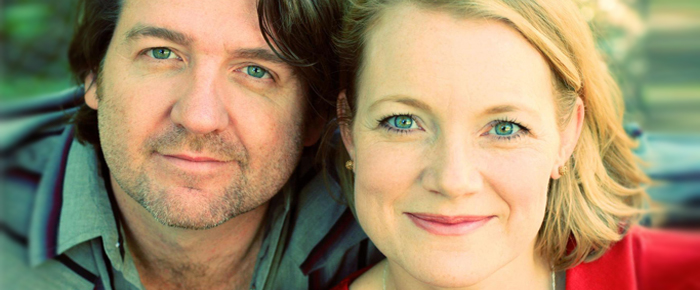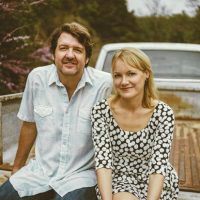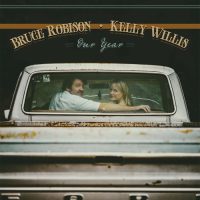
By Eleni P. Austin
Bruce Robison and Kelly Willis aren’t exactly household names, but they should be. Both have been performing and recording Country music since the early ‘90s.
Kelly Willis grew up in a military family and began performing as a teenager. By 1990, she was signed to the giant MCA label. Groomed for the glitz and glamour of Nashville, Willis released a couple of well-received albums, that sold modestly but received little airplay on Country radio.
But Willis didn’t enjoy the endless dog & pony show. It wasn’t long before she before rebelled and jumped ship. By the end of the decade she was making music her own way, having signed to the much smaller Rykodisc label.
Bruce Robison’s career endured a similar trajectory. The Austin, Texas native was signed to Lucky Dog Records, a subsidiary of the mighty Columbia label. His records, along with his brother, Charlie’s, were critically acclaimed, but not exactly commercially successful.
Robison received more recognition when other artists covered his songs. The Dixie Chicks recorded “Travelin’ Soldier,” and Tim McGraw and Faith Hill took “Angry All The Time” to #1 When George Strait covered “Wrapped” it went to the top of the charts.
Robison and Willis met and were married by 1996. While he has recorded seven solo albums, she has made six. In between, they managed to have four children. After recording a Christmas record in 2003, the duo waited 10 years before collaborating again. The result, Cheater’s Game was released in 2013.
Now the couple is back with their second joint effort, entitled Our Year. The first two tracks, deliver a one-two punch that chronicle the economic disparities that plague this country.
“Departing Louisiana” is a loping charmer anchored by mandolin, fiddle and field harmonium. Robison’s demeanor is sweet and rueful as he ping-pongs between Louisiana and Texas, looking for steady work.
On “Motor City Man” Willis takes the lead, a high-lonesome harmonica and flippant fiddle runs punctuate verses about tough times in the auto industry. “This plant’s closing down and I’m leaving town, I’ll be gone by pay day.”
Robison channels the classic Country of Eddy Arnold and Glen Campbell on both “Carousel” and “Hangin’ On.” The former charts a fractured relationship that “goes round and round and nothing ever changed.” Over swelling strings, forlorn steel guitar and sawing fiddle, Robison’s warm tenor wraps around the ache of heartbreak. The wistful melody shares some musical DNA with the old Eddy Arnold chestnut, “Welcome To My World.”
The latter is slow and yearning, echoing the stately grace of “Wichita Lineman.” Robison is resigned.
“My heart is like a yo-yo on a string, I’m tied to you right or wrong/My love keeps a grown’ as you love keeps a slowin/Just enough to keep me hangin’ on.”
Willis takes the lead on “Lonely For You,” The melody moves at a galloping gait, accented by rattle snake percussion, slithery harmonica and keening fiddle. Willis reassures a beau, “I may hang out in a crowd where the lights are bright and the music’s loud/But deep inside I’m feeling blue, I’m only lonely baby for you.”
Willis also offers an assured take on Tom T. Hall’s “Harper Valley P.T.A.” Although the song is nearly 50 years old, the tale of small-town hypocrisy still resonates.
The couple essay a musical conversation, sharing vocal duties on “Shake Yourself Loose” and “I’ll Go To My Grave Loving You.”
A clip-clop rhythm and lonely lap steel propel “…Loose’s” saga of mutual infidelity. “I’m not running away from trouble, I’m walking away from an accident involving a personality double/Ain’t nothing I can say, ain’t nothing I can do, when I see that feelin’ coming over you.” Their voices intertwine beautifully, even as Willis’ trills recall Linda Ronstadt’s version of “Blue Bayou.”
“…Go To My Grave..” opens with gospel inflections but the melody gathers speed, morphing into a stompy Grand Ol’ Opry hoe-down featuring rippling mandolin, searing lap steel and jaunty fiddle interplay. The collective mood is equal parts playful and meditative as they pledge eternal devotion. “I’d lay down my life loving you, I’d work day and night loving you/And when life calls us both above, that’s when you’ll know you’ve been loved/I’ll go to my grave loving you.”
The album closes with a countrified version of the Zombies’ “This Will Be Our Year.” The slightly obscure British Invasion-era track was used to devastating effect on a recent episode of “Mad Men.” Although it isn’t as well known, it is heartfelt and beautiful as the Beach Boys’ epochal “God Only Knows.”
Robison and Willis imbue lyrics like “The way you held me up when I was down, I won’t forget the way you said ‘darling I love you’/You gave me faith to go on, now we’re there and we’ve only just begun/This will be our year, took a long time,” with a tenderness and depth of connubial familiarity. It’s as though they had written the words themselves: A poignant end to a great record.
The Country Charts are littered with Pop acts that conveniently sport cowboy hats. It’s clear that Bruce Robison and Kelly Willis will never be a part of that superficial scene. Our Year is as straightforward and authentic as it gets.












































